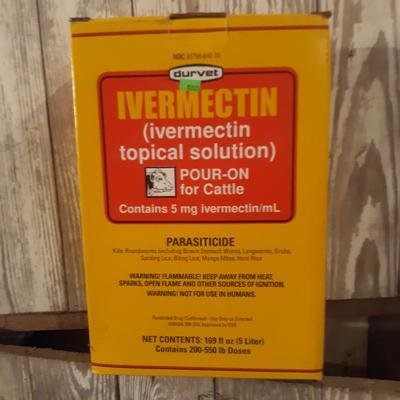I had a headache the other day, so I took some cow pain reliever to make it go away.
Actually, it was just aspirin that was in the medicine cabinet, and not the aspirin boluses that are kept in the barn.
Still, the two medications are the same thing, except one is concentrated for human use, and the other for livestock.
It’s not complicated.
But that wasn’t the case recently when ivermectin was mentioned as a possible remedy for COVID-19. Right away, medical professionals and health agencies disputed the claim, and I’m not going to debate the merits of using ivermectin to combat COVID.
What bothers me, however, is the ignorance exercised by some to dismiss the ivermectin claim by stating people were taking “horse dewormer.”
Again, I’m not advocating for or against the use of ivermectin as a COVID treatment, but rather the harm that comes from generalizing the drug as nothing more than a “horse dewormer.”
Yes, ivermectin is a common and effective dewormer for a variety of livestock. I use it on my cows and it works. But ivermectin is also approved by the U.S. Food and Drug Administration for human use. It’s also available in prescription form or over the counter for people, used to treat roundworm infections and head lice, among other things, according to the National Institutes of Health.
Referring to ivermectin as a “horse dewormer” while attempting to warn against its use as a COVID treatment comes across as disrespectful. It’s a misleading approach, and it causes more harm than good.
Unfortunately, such an approach was applied by the FDA in August, when the agency sent out the following tweet in response to reports of ivermectin being used as a COVID medication: “You are not a horse. You are not a cow. Seriously, y'all. Stop it.”
If using “y’all” in a statement is the FDA’s attempt to connect with the rural population, it’s an insulting use of vernacular that exemplifies a vast disconnect.
Seriously.
People know that ivermectin is formulated for human use, so why mention horses and cows as if we’re naïve and uneducated? Instead of referring to it as “the horse deworming drug,” why not the “antiparasitic drug approved by the FDA for human use?”
Ivermectin isn’t the only drug approved for use by both people and livestock.
A 325-milligram aspirin tablet does wonders to alleviate a headache, while two 15.5-gram aspirin boluses work great to remedy pain in a cow.
When a person has a bacterial infection, a doctor might prescribe 500 milligrams of penicillin. To treat shipping fever in a cow, the recommended dose is 1 milliliter (1,000 milligrams) for every 100 pounds of weight.
Aspirin and penicillin are used for human and livestock applications, yet the formulations and dosage rates are different for each.
Ivermectin is no different.
Yet when a doctor prescribes penicillin, or someone takes an aspirin for a headache, no one accuses them of taking “horse medicine.”
If people were actually buying pour-on ivermectin and drenching themselves with it in order to stave off COVID, that wouldn’t be a good idea.
The FDA and the Centers for Disease Control feel that taking ivermectin in any form to treat COVID is not a good idea, and it’s a message that should be taken seriously.
But don’t insult our intelligence by calling it a horse dewormer. We know that ivermectin has a human application for parasitic infections, and to manipulate that fact undermines any opportunity for a serious discussion, and warning, regarding its use.
If ivermectin isn’t safe for COVID, tell us why and leave it at that.
Leave the horses and cows out of it.

